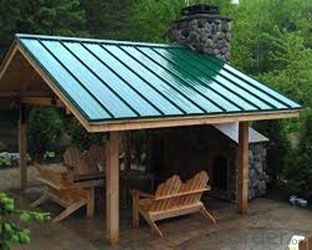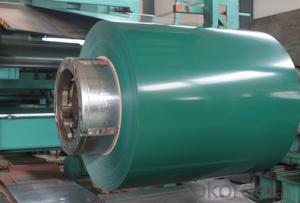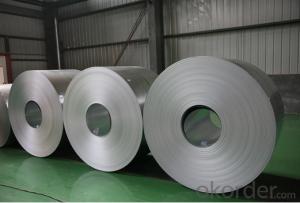0.3mm Thickness PPGI Prepainted Galvanized Steel Coil With Different Width
- Loading Port:
- China main port
- Payment Terms:
- TT OR LC
- Min Order Qty:
- 25 m.t.
- Supply Capability:
- 10000 m.t./month
OKorder Service Pledge
OKorder Financial Service
You Might Also Like
0.3mm Thickness PPGI Prepainted Galvanized Steel Coil With Different Width
Product Description
Specifications:
1. Thickness: 0.12mm-1.3mm
2. Width: 600mm-1250mm
3. Length: According to client's demands
4. Top paint: 15 to 25 um (5 um + 12-20 um)
Back paint: 7 +/- 2 um
5. Gloss: Normal or High gloss
6. Zinc coating: Z50-Z275G/psm
7. Inside Diameter: 508mm/610mm
8. Outside Diameter: 1000mm-1500mm
9. Coil weight: 3-8 tons
10. Payment: T/T, L/C, D/P, Paypal, Western Union
11. Trade Term: FOB, CFR, CIF
12. MOQ: 25 Mt
13. Package: Export standard package or as request
14. Shipment: By container
15. Standard: AISI, ASTM, BS, DIN, GB, JIS
16. Grade: JIS G3322, CGLCC, ASTM A755, CS-B
Company Introduction:
CNBM Steel is mainly engaged in producing and exporting galvanized steel coil/sheet(GI), prepainted galvanized steel coil/sheet(PPGI), corrugated galvanized sheet and tinplate coil/sheet. CNBM Steel has also become the agent of hot rolled coil/sheet, cold rolled coil/sheet, I beam, angle steel and channel steel.
Company Culture:
Take customers as the honoured, Take quality as the foundation!
Strive For Survival On The Basis Of Quality!
Why Us:
1. ISO, BV, CE, SGS approved
2. Competitive price and quality from our own factory
3. Efficient service team online for 24 hours
4. Smooth production ability(50000tons/month)
5. Quick delivery and standard exporting package
6. Flexible payment with T/T, L/C, etc
Name | 0.3mm Thickness PPGI Prepainted Galvanized Steel Coil |
Resin constructure | Double painting and double baking process |
Productivity | 150,000Tons/year |
Thickness | 0.12-1.3mm |
Width | 600-1250mm |
Coil Weight | 3-8 Tons |
Inside Diameter | 508mm Or 610mm |
Outside Diameter | 1000mm-1500mm |
Zinc Coating | Z50-Z275G/psm |
Painting | Top: 15 to 25 um (5 um + 12-20 um) back: 7 +/- 2 um |
Standard | JIS G3322 CGLCC ASTM A755 CS-B |
SurfSurface coating | PE, SMP, HDP, PVDF |
Back side coatingcolor | Light grey, white and so on |
Application | PPGI is featured with light-weight, good looking and |


FAQ
1. Do you have QC team?
Yeah, sure, our QC team is very important, they will keep the quality control for our products.for quality inspection every day.
2. What's your normal delivery time?
Our delivery time about 10-20days for standard sizes, if you have other requirements like hardness and width ,it is about 20-40days. But don't worry ,we also try our best for the delivery time ,because time longer and our cost is higher.
3.Are the products tested before shipping?
Yes, all of our PPGI and GI was qualified before shipping. We test every batch every day.
- Q:I have a job where I'm required to wear ANSI certified steel toed boots or shoes(so long as its ANSI). Thing is, I'm a vegan. I do NOT want to buy leather, and I will go to great lengths to buy a non leather shoe/boot I can wear on the job! I AM currently borrowing my dad's leather ANSI boots, but would very much love to be able to rock a pair of cruelty free boots/shoes on the job!It does not have to be certified vegan just all man-made materials and no leather/sued and other such stuff where animals have to die. It would make me no better than the massive slaughterhouse industries and such. Valueing money of ver live/morals. I don't want one of the first things I need to do in my manufacturing job is compromising my morals. :3So if you know of an ANSI vegan friendly boot brand PLEASE TELL ME! *gets on knees begging*Money isn't really an option for me, I'll just continue borrowing my dad's boots till I save up enough!Thanks in advance! :D
- This Site Might Help You. RE: Vegan ANSI Steel Toes? I have a job where I'm required to wear ANSI certified steel toed boots or shoes(so long as its ANSI). Thing is, I'm a vegan. I do NOT want to buy leather, and I will go to great lengths to buy a non leather shoe/boot I can wear on the job! I AM currently borrowing my dad's leather ANSI...
- Q:So I'm trying to decide which is better. I've always had aluminum on my 6 yr old tb gelding as I do hunters on him. He's never had steel on but I've recently moved and the shoer here is more expensive. So is aluminum really worth the extra cash to keep him light on his feet or is steel really not that much different?
- Steel is not much different to be honest as long as you aren't doing any special shoes. A horse like yours I would probably stick in some steel eventers and go on your way. That's about average and honestly between a comparable aluminum shoe you won't see a difference in his movement unless the farrier starts messing with breakovers and shoeing him different. There are few times when I will do aluminum and all of it has to do with special circumstances. My 4 year old is in aluminums on his front right now because his special shoes are close to an 3/4 thick and about an inch wide. In steel those shoes would be very heavy, but those are what he works best in compared to the steel. I can give him more of the support he needs with the aluminum than I can with the steel. I also prefer eggbars, hartbars, etc to be done in aluminum for the sheer size of the shoe. Steel lasts more resets and it's stronger than aluminum. Aluminum is useful for therapuedic shoes. So you all have the pros and cons, but a horse in shoes with no special needs is a horse who should just stay in steel.
- Q:haii, i have this guitar thats quite old and im not quite sure whether to put steel strings on it. there were very thin badly worn steel strings on it when i got it, so i think its an acoustic
- That's a very low-end Kay, maybe from the 60's or 70's. It has a weird mixture of steel-string and classical features that you often see in cheap imports from around that time, maybe because the factory didn't want to stock different parts for different lines. The tuners (one of which is missing) are made for steel strings. They will work with nylon but not well. The bridge is a generally classical type but appears to be bolted on and seems to have some compensation carved into the saddle, which indicates it may have been intended for steel strings. Probably it's ladder braced, which is not a great design for either type. It has a classical rosette and a steel-string pickguard. I am guessing the neck has steel reinforcement but unless there's a sticker there's no way to tell. Personally I'd put light or (preferably) extra-light steel strings on it. The short scale length will help keep the tension down. I'd keep an eye on the neck though. You could also try silk steel to be on the safe side, but the bass response will probably be lacking.
- Q:How are steel coils used in the production of bridges?
- Steel coils are used in the production of bridges as they provide a reliable and strong structural material. These coils are shaped and formed into various components, such as beams and girders, which are then assembled to create the bridge's framework. The steel coils' durability and high tensile strength make them ideal for supporting heavy loads and withstanding the forces experienced by bridges.
- Q:How are steel coils processed for cold rolling or hot rolling?
- Steel coils are processed for cold rolling or hot rolling through a series of steps. For cold rolling, the steel coils are first cleaned and pickled to remove any impurities. They are then passed through a series of rolling mills, where the steel is gradually reduced in thickness and elongated. This process improves the steel's strength and surface finish. In contrast, for hot rolling, the steel coils are heated to high temperatures and then passed through a series of rolling mills. The hot rolling process allows for greater deformability and shaping of the steel, resulting in different thicknesses and shapes.
- Q:What are the factors affecting the price of steel coils?
- There are several factors that can affect the price of steel coils. Some of the key factors include the demand and supply dynamics of the steel market, global economic conditions, raw material costs, production costs, government policies and regulations, currency fluctuations, and competition among steel manufacturers. Additionally, factors like transportation costs and energy prices can also impact steel coil prices.
- Q:Can steel coils be used in the production of electrical components?
- Yes, steel coils can be used in the production of electrical components. Steel is a commonly used material in the manufacturing of electrical components like transformers, motors, and generators. Steel coils are often used as a core material in transformers due to their magnetic properties and ability to conduct electricity.
- Q:In terms of weight to strength titanium is stronger. But is it stronger than mild steel? If it is stronger, how much stronger is it?
- The tensile strength of mild steel is about 70kpsi. Pure titanium is 60-110kpsi, and with 7% manganese it is 130-170kpsi. 1kpsi = one thousand pounds per square inch. So in other words, high grade titanium can be somewhat stronger than mild steel.
- Q:How do steel coil manufacturers minimize waste and maximize efficiency?
- Combining advanced technology, process optimization, and waste management practices allows steel coil manufacturers to minimize waste and maximize efficiency. One effective method is to employ advanced automation and control systems during production. These systems can monitor and adjust parameters like temperature, pressure, and speed to ensure optimal operation. By closely monitoring and controlling these factors, manufacturers can reduce defects and errors, thus minimizing waste. Another approach is to adopt lean manufacturing principles, which involve eliminating non-value-adding activities and streamlining the production process. By analyzing the entire workflow, manufacturers can identify areas for improvement, such as reducing setup times, eliminating bottlenecks, and optimizing material flow. This results in a more efficient and streamlined production process, reducing waste and increasing efficiency. Additionally, effective waste management practices can be implemented. This includes proper handling and disposal of waste materials, as well as implementing recycling programs. By separating and recycling materials like scrap metal, manufacturers can minimize waste generation and reduce environmental impact. Collaborating with recycling companies ensures proper management and recycling of waste materials. In conclusion, steel coil manufacturers can achieve waste reduction and efficiency maximization by utilizing advanced technology, implementing lean manufacturing principles, and adopting effective waste management practices. Continuously striving for improvement and optimization in processes enables manufacturers to reduce waste, increase productivity, and ultimately achieve higher levels of efficiency.
- Q:What are the common sizes of steel coils?
- The common sizes of steel coils vary depending on the specific needs and requirements of different industries. However, there are some standard sizes that are commonly used in the steel manufacturing and processing sectors. These include: 1. Slit Coils: Slit coils are typically smaller in size and are commonly available in widths ranging from 0.5 inches to 72 inches. The weight of slit coils varies, but it is usually between 1000 pounds to 50,000 pounds. 2. Master Coils: Master coils are larger in size and are typically used in steel processing facilities to produce various steel products. The width of master coils usually ranges from 36 inches to 96 inches, while the weight may vary from 5,000 pounds to 60,000 pounds. 3. Sheet Coils: Sheet coils are often used in construction, automotive, and appliance manufacturing industries. The standard sizes for sheet coils vary, but they are commonly available in widths of 48 inches, 60 inches, and 72 inches, with lengths ranging from 96 inches to 240 inches. 4. Plate Coils: Plate coils are primarily used in heavy-duty applications such as shipbuilding, bridge construction, and pressure vessel manufacturing. The sizes of plate coils are typically larger, with widths ranging from 36 inches to 96 inches, and lengths varying from 96 inches to 480 inches. It is important to note that these sizes are not fixed and can be customized based on specific customer requirements. Steel manufacturers and suppliers often have the capability to produce coils in various sizes to meet the diverse needs of their clients.
1. Manufacturer Overview |
|
|---|---|
| Location | |
| Year Established | |
| Annual Output Value | |
| Main Markets | |
| Company Certifications | |
2. Manufacturer Certificates |
|
|---|---|
| a) Certification Name | |
| Range | |
| Reference | |
| Validity Period | |
3. Manufacturer Capability |
|
|---|---|
| a)Trade Capacity | |
| Nearest Port | |
| Export Percentage | |
| No.of Employees in Trade Department | |
| Language Spoken: | |
| b)Factory Information | |
| Factory Size: | |
| No. of Production Lines | |
| Contract Manufacturing | |
| Product Price Range | |
Send your message to us
0.3mm Thickness PPGI Prepainted Galvanized Steel Coil With Different Width
- Loading Port:
- China main port
- Payment Terms:
- TT OR LC
- Min Order Qty:
- 25 m.t.
- Supply Capability:
- 10000 m.t./month
OKorder Service Pledge
OKorder Financial Service
Similar products
New products
Hot products
Related keywords



























